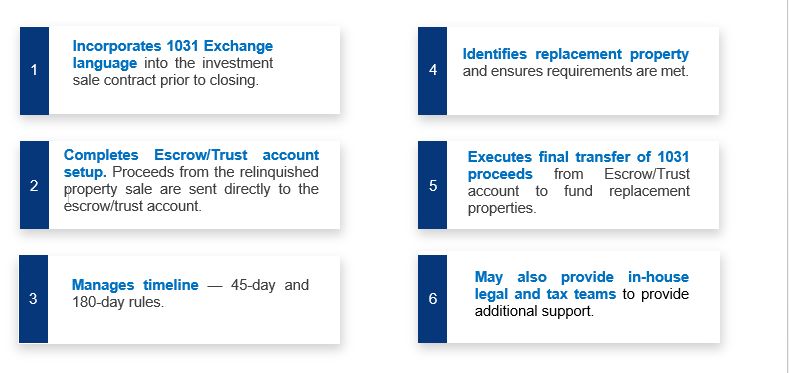What is a Qualified Intermediary?
WHAT IS A QUALIFIED INTERMEDIARY?
 Let’s just start off by stating that if you are trying to defer taxes on capital gains from a real estate sale by using a 1031 exchange, you are going to need to engage a Qualified Intermediary or QI. If mistakes are made during any of the required processes or you miss a deadline you may have nullified your chances of using the 1031 exchange to defer taxes. The QI acts as an accommodator for these processes and ensures the safety and security of the funds during the exchange.
Let’s just start off by stating that if you are trying to defer taxes on capital gains from a real estate sale by using a 1031 exchange, you are going to need to engage a Qualified Intermediary or QI. If mistakes are made during any of the required processes or you miss a deadline you may have nullified your chances of using the 1031 exchange to defer taxes. The QI acts as an accommodator for these processes and ensures the safety and security of the funds during the exchange.
"A Qualified Intermediary (QI) also known as an Exchange Accommodator refers to a person that acts as an intermediary qualified under certain sections of the U.S. Internal Revenue Code to undertake specified activities related to a 1031 exchange. The role of a QI is defined in Treas. Reg. §1.1031(k)-1(g)(4)."
One of the key elements of a 1031 Exchange is that the person who has sold their property, the “exchanger” must assign to the Qualified Intermediary their interest in the property that they have just sold. This is referred to as the relinquished property. The QI also acquires the Replacement property as you assign your interest in that property to them becoming a principal in this transaction, in your place.
A Qualified Intermediary plays a pivotal role in all stages of the 1031 process Including:

 It is not until the entire 1031 exchange process is completed that you will have full access to the funds of this arrangement, however up until this point it is the duty of the Qualified Intermediary to safeguard that money.
It is not until the entire 1031 exchange process is completed that you will have full access to the funds of this arrangement, however up until this point it is the duty of the Qualified Intermediary to safeguard that money.
Anyone who is related to the taxpayer, or who has had a financial relationship with the taxpayer aside from providing routine financial services within the two years prior to the close of escrow of the exchange cannot serve as the QI. A QI should be bonded and insured against errors and omissions. Relevant educational background such as tax, law or finance is desired. Nevada is the only state that requires a QI to be licensed.
The QI enters into a written agreement with the taxpayer the where QI transfers the relinquished property to the buyer, and transfers the replacement property to the taxpayer pursuant to the exchange agreement. The QI holds the proceeds from the sale of the relinquished property in a trust or escrow account in order to ensure the Taxpayer never has actual or constructive receipt of the sale proceeds.
If mistakes are made during any of the required processes or you miss a deadline you may nullify your 1031 exchange.
Ultimately, it is your responsibility to ensure what happens during your 1031 exchange process and the QI is there to support you during this period. You should still work with your attorney or tax professional. The QI is there to protect your money, coordinate the exchange process and basically to make certain that the 1031 exchange is done properly and observes the IRS 1031 exchange rules.
Keep this in mind as you prepare for a 1031 Exchange.
- The 1031 Exchange structuring begins before the investment property is sold.
- Taking constructive receipt of any sales proceeds will immediately terminate the Exchange.
- It’s important to seek help from a Qualified Intermediary before closing on the sale of the investment property.
Give us a call and lets discuss 1031 DST's
972-661-1283 ext: 3

